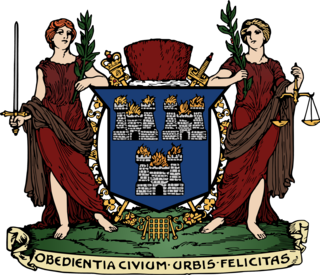
The Northern Ireland Assembly, often referred to by the metonym Stormont, is the devolved legislature of Northern Ireland. It has power to legislate in a wide range of areas that are not explicitly reserved to the Parliament of the United Kingdom, and to appoint the Northern Ireland Executive. It sits at Parliament Buildings at Stormont in Belfast.

The Welsh Government is the executive arm of the devolved government of Wales. The government consists of cabinet secretaries and ministers. It is led by the first minister, usually the leader of the largest party in the Senedd, who selects ministers with the approval of the Senedd. The government is responsible for tabling policy in devolved areas for consideration by the Senedd and implementing policy that has been approved by it.

Dublin City Council is the local authority of the city of Dublin in Ireland. As a city council, it is governed by the Local Government Act 2001. Until 2001, the authority was known as Dublin Corporation. The council is responsible for public housing and community, roads and transportation, urban planning and development, amenity and culture and environment. The council has 63 elected members and is the largest local council in Ireland. Elections are held every five years and are by single transferable vote. The head of the council has the honorific title of Lord Mayor. The city administration is headed by a chief executive, Richard Shakespeare. The council meets at City Hall, Dublin.
A cabinet secretary is usually a senior official who provides services and advice to a cabinet of ministers as part of the Cabinet Office. In many countries, the position can have considerably wider functions and powers, including general responsibility for the entire civil service.

The Victorian Legislative Assembly is the state lower house of the bicameral Parliament of Victoria in Australia; the state upper house being the Victorian Legislative Council. Both houses sit at Parliament House in Spring Street, Melbourne. The main colour used for the upholstery and carpets furnishing the Chamber of the Legislative Assembly is green.
The law officers are the senior legal advisors to His Majesty's Government of the United Kingdom and devolved governments of Northern Ireland, Scotland and Wales. They are variously referred to as the Attorney General, Solicitor General, Lord Advocate, or Advocate General depending on seniority and geography – though other terms are also in use, such as the Counsel General for Wales. Law officers in these roles are distinguished by being political appointees, while also being bound by the duties of independence, justice and confidentiality among the other typical professional commitments of lawyers. These roles do not have any direct oversight of prosecutions nor do they directly lead or influence criminal investigations. This is a distinguishing factor between law officers and the state attorneys general of the United States or US Attorney General.

In the United Kingdom, the Electoral Commission is the national election commission, created in 2001 as a result of the Political Parties, Elections and Referendums Act 2000. It is an independent agency that regulates party and election finance and sets standards for how elections should be run.

The Political Parties, Elections and Referendums Act 2000 is an Act of Parliament of the United Kingdom that sets out how political parties, elections and referendums are to be regulated in the United Kingdom. It formed an important part of the constitutional reform programme implemented by the 1997 Labour Government, building on the Registration of Political Parties Act 1998 which was passed two years earlier.

The mayor of Toronto is the head of Toronto City Council and chief executive officer of the municipal government. The mayor is elected alongside city council every four years on the fourth Monday of October; there are no term limits. While in office, mayors are styled His/Her Worship.

The municipal government of Toronto is the local government responsible for administering the city of Toronto in the Canadian province of Ontario. Its structure and powers are set out in the City of Toronto Act.

The government of the U.S. State of Oklahoma, established by the Oklahoma Constitution, is a republican democracy modeled after the federal government of the United States. The state government has three branches: the executive, legislative, and judicial. Through a system of separation of powers or "checks and balances," each of these branches has some authority to act on its own, some authority to regulate the other two branches, and has some of its own authority, in turn, regulated by the other branches.
The Clerk of the Australian Senate is the head of the Parliamentary Department of the Senate, which is the parliamentary department supporting the work of the Australian Senate. The Clerk is responsible to the President of the Senate who in turn is responsible for the department to the Senate. The Department of the Senate is not part of the Executive Government of Australia. The current Clerk is Richard Pye. The Deputy Clerk of the Senate is Jackie Morris. Since 1999, the terms of the Clerk of the Senate, as that of the Clerk of the House of Representatives, have been limited to 10 years. The change did not apply to the incumbents.
The Department of the Prime Minister and Cabinet is the central public service department of New Zealand, charged with providing support and advice to the governor-general, the prime minister and members of the Cabinet of New Zealand. The department is also charged with centrally leading New Zealand's "national security planning, which includes civil defence." The department's overall area of responsibility is in helping to provide, at an administrative level, the "constitutional and institutional glue" within New Zealand's parliamentary democracy. The department along with the Public Service Commission, and the Treasury constitute the central agencies or public service departments leading the state sector of New Zealand.

The Senedd Commission is the corporate body for the Senedd of Wales. The commission is responsible for ensuring the property, staff and services are provided for the Senedd. The commission consists of the Llywydd of the Senedd and four members from different political parties, who each have different portfolios of work. The commission is supported by staff in the Commission and Support Service. Prior to 2020, the body was known as the National Assembly for Wales Commission.
The Michigan Department of Technology, Management & Budget (DTMB), formerly Michigan Department of Management and Budget, is a principal department of the government of Michigan responsible for various support functions within the government.
The Australian Capital Territory Electoral Commission, branded Elections ACT, is the agency of the Government of the Australian Capital Territory with responsibility for the conduct of elections and referendums for the unicameral ACT Legislative Assembly; the determination of electoral boundaries for the ACT; and the provision of electoral advice and services to government and on-government agencies. The responsibilities and roles of the Commission are set out in the 1992 Electoral Act and subsequent amendments.
The cabinet of Sarawak serves as the primary decision-making body within the executive branch of the Government of Sarawak. Its composition mirrors that of the federal level, albeit on a smaller scale. At its core is the Premier, appointed by the Yang di-Pertua Negeri (Governor) based on their ability to secure majority support in the Sarawak State Legislative Assembly. The Cabinet comprises ministers drawn from the legislative body, appointed by the Premier's recommendation.

A Machakos County Assembly is the forum through which the people of Machakos participate in the making of laws, formulation of policies for taxation, budgeting, and the establishment of the Machakos County public service.

The government of Edo State serves as the governing authority for Edo State, one of the 36 states within the Federal Republic of Nigeria. It comprises three branches of government: the executive branch led by the Governor of Edo State, the legislative branch represented by the Edo State House of Assembly, and the judicial branch, including the Judiciary of Edo State and the Courts of Edo State. The state government operates under the frameworks of the Constitution of Nigeria and the Constitution of Edo State, delineating the powers, duties, and functions of state organs and institutions. It also encourages direct participation from the electorate through mechanisms such as initiative, referendum, and ratification.
The clerk of the Scottish Parliament is the chief executive of the Scottish Parliament.












